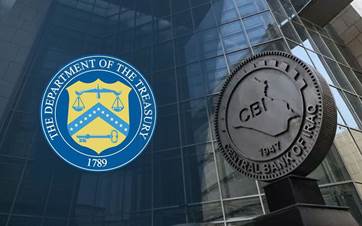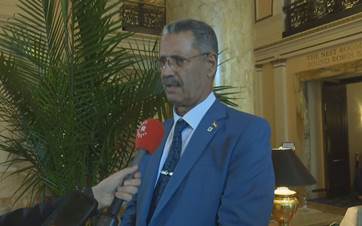ERBIL, Kurdistan Region - The natural resources ministry of the Kurdistan Regional Government (KRG) on Tuesday accused the Iraqi government of “attributing the responsibility of the failure” of resumption of the Region’s oil export to the regional government in Erbil.
Oil exports from the Kurdistan Region through the Iraq-Turkey pipeline have been halted since March 2023 after a Paris-based arbitration court ruled in favor of Baghdad against Ankara, saying the latter had breached a 1973 pipeline agreement by allowing Erbil to begin independent oil exports in 2014.
“The Kurdistan Regional Government (KRG) has become aware of public comments recently made by the Ministry of Oil (MOI) of the Federal Government of Iraq (FGI) relating to the export of oil from the Kurdistan Region. Those comments seek to attribute responsibility for the failure of oil exports to the KRG itself,” read a statement from the natural resources ministry.
The ministry cited comments that were made by the Iraqi government particularly stating their insistence on resuming oil exports and adherence to the constitution and law, but putting the blame on the KRG’s oil contracts with the International Oil Companies (IOCs), claiming they lack constitutional and legal basis.
“As the MOI [Ministry of Oil] well knows, there is no provision of the 2005 Constitution of Iraq that confers any power upon the FGI [Federal Government of Iraq] to ‘approve’ contracts issued by the KRG,” continued the statement arguing that “the legal basis for those production contracts is the 2007 KRG Oil and Gas Law, passed unanimously by the democratically-elected Kurdistan parliament.”
The IOCs and the KRG are bound by Production Sharing Contracts (PSCs). Under the Kurdistan Region’s PSC model, the IOCs cover the entire cost of production while the KRG receives the lion’s share of the profits from successful projects.
Baghdad has repeatedly said that the PSCs between the IOCs and the KRG are a violation of the Iraqi constitution, stressing that the contracts need to be amended into service contracts such as the ones in federal Iraq before exports could resume.
The KRG natural resources ministry says its 2007 oil and gas law “is acknowledged by the world’s leading constitutional and international lawyers as having a solid basis in the 2005 Constitution of Iraq” while the Iraqi oil minister relies only on a February 2022 order “from a panel or committee of political appointees in Baghdad that asserts the unconstitutionality of the 2007 KRG law.”
The KRG likened the February 2022 order to those of dictator Saddam Hussein-era, stating that it was “almost comically devoid of even the most rudimentary legal reasoning.”
Despite several talks between Kurdish, Iraqi, and Turkish officials, the exports have yet to resume and many international oil companies have suspended production. Nearly 15 billion dollars in revenue have been lost, according to oil companies.
Bassem al-Awadi, the spokesperson for the Iraqi government, told Rudaw on Monday that “Turkey informed Iraq over a month ago that they are ready to pump oil through their pipelines to the Ceyhan Port. Therefore, the problem has ended and there is no problem now.”
The issue now lies between the federal government, the Kurdistan Regional Government, and the IOCs in the Kurdistan Region, according to Awadi.
“According to the new directives, these companies must conduct business with the federal government and the State Oil Marketing Organization (SOMO). Consequently, new contracts, agreements, and negotiations should ensue,” he said.
The Association of the Petroleum Industry of Kurdistan (APIKUR) said in a statement earlier this month that it “remains ready to immediately continue discussions with Government of Iraq and Kurdistan Regional Government officials to restore exports through the ITP [Iraq-Turkey pipeline].”
The statement came after a meeting between the Iraqi Prime Minister Mohammed Shia’ al-Sudani and US President Joe Biden at the White House.
Sudani and Biden “affirmed the importance of ensuring Iraqi oil can reach international markets and expressed their desire to reopen the Iraq-Turkiye Pipeline,” according to a joint statement between the two leaders following their meeting.
Oil exports from the Kurdistan Region through the Iraq-Turkey pipeline have been halted since March 2023 after a Paris-based arbitration court ruled in favor of Baghdad against Ankara, saying the latter had breached a 1973 pipeline agreement by allowing Erbil to begin independent oil exports in 2014.
“The Kurdistan Regional Government (KRG) has become aware of public comments recently made by the Ministry of Oil (MOI) of the Federal Government of Iraq (FGI) relating to the export of oil from the Kurdistan Region. Those comments seek to attribute responsibility for the failure of oil exports to the KRG itself,” read a statement from the natural resources ministry.
The ministry cited comments that were made by the Iraqi government particularly stating their insistence on resuming oil exports and adherence to the constitution and law, but putting the blame on the KRG’s oil contracts with the International Oil Companies (IOCs), claiming they lack constitutional and legal basis.
“As the MOI [Ministry of Oil] well knows, there is no provision of the 2005 Constitution of Iraq that confers any power upon the FGI [Federal Government of Iraq] to ‘approve’ contracts issued by the KRG,” continued the statement arguing that “the legal basis for those production contracts is the 2007 KRG Oil and Gas Law, passed unanimously by the democratically-elected Kurdistan parliament.”
The IOCs and the KRG are bound by Production Sharing Contracts (PSCs). Under the Kurdistan Region’s PSC model, the IOCs cover the entire cost of production while the KRG receives the lion’s share of the profits from successful projects.
Baghdad has repeatedly said that the PSCs between the IOCs and the KRG are a violation of the Iraqi constitution, stressing that the contracts need to be amended into service contracts such as the ones in federal Iraq before exports could resume.
The KRG natural resources ministry says its 2007 oil and gas law “is acknowledged by the world’s leading constitutional and international lawyers as having a solid basis in the 2005 Constitution of Iraq” while the Iraqi oil minister relies only on a February 2022 order “from a panel or committee of political appointees in Baghdad that asserts the unconstitutionality of the 2007 KRG law.”
The KRG likened the February 2022 order to those of dictator Saddam Hussein-era, stating that it was “almost comically devoid of even the most rudimentary legal reasoning.”
Despite several talks between Kurdish, Iraqi, and Turkish officials, the exports have yet to resume and many international oil companies have suspended production. Nearly 15 billion dollars in revenue have been lost, according to oil companies.
Bassem al-Awadi, the spokesperson for the Iraqi government, told Rudaw on Monday that “Turkey informed Iraq over a month ago that they are ready to pump oil through their pipelines to the Ceyhan Port. Therefore, the problem has ended and there is no problem now.”
The issue now lies between the federal government, the Kurdistan Regional Government, and the IOCs in the Kurdistan Region, according to Awadi.
“According to the new directives, these companies must conduct business with the federal government and the State Oil Marketing Organization (SOMO). Consequently, new contracts, agreements, and negotiations should ensue,” he said.
The Association of the Petroleum Industry of Kurdistan (APIKUR) said in a statement earlier this month that it “remains ready to immediately continue discussions with Government of Iraq and Kurdistan Regional Government officials to restore exports through the ITP [Iraq-Turkey pipeline].”
The statement came after a meeting between the Iraqi Prime Minister Mohammed Shia’ al-Sudani and US President Joe Biden at the White House.
Sudani and Biden “affirmed the importance of ensuring Iraqi oil can reach international markets and expressed their desire to reopen the Iraq-Turkiye Pipeline,” according to a joint statement between the two leaders following their meeting.








Comments
Rudaw moderates all comments submitted on our website. We welcome comments which are relevant to the article and encourage further discussion about the issues that matter to you. We also welcome constructive criticism about Rudaw.
To be approved for publication, however, your comments must meet our community guidelines.
We will not tolerate the following: profanity, threats, personal attacks, vulgarity, abuse (such as sexism, racism, homophobia or xenophobia), or commercial or personal promotion.
Comments that do not meet our guidelines will be rejected. Comments are not edited – they are either approved or rejected.
Post a comment